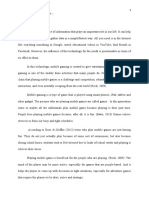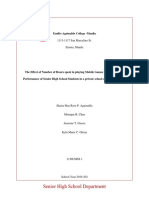Effects of Mobile Phone Gaming on the Academic Performance of Senior High School Students
Chapter 1
THE PROBLEM AND ITS BACKGROUND
This chapter includes the introduction, theoretical and conceptual framework, statement of the
problem, scope and delimitation, significant of the study and the definition of terms.
Background of the Study
In recent years, mobile phone gaming has become a dominant form of entertainment among
teenagers, particularly senior high school students. The accessibility of smartphones and the
proliferation of mobile gaming apps have led to significant shifts in how students allocate their
leisure time. Various studies have indicated that excessive use of mobile phones for gaming can
lead to a decrease in students’ academic performance due to time displacement, reduced
cognitive control, and insufficient rest (Chang & Zhang, 2022; Williams et al., 2023). However,
some research suggests that moderate gaming may enhance cognitive skills and problem-
solving abilities (Johnson & Wu, 2021). Thus, the effects of mobile gaming on education present
a complex picture requiring thorough investigation.
Mobile Phone Gaming has become an increasingly popular pastime among teenagers,
particularly senior high school students. While mobile games can offer benefits such as
cognitive skills development and entertainment, excessive gaming can have detrimental effects
on academic performance. In contrast, Heiden (2019) found that problematic and excessive
mobile phone gaming can have negative effects including students poor academic performance.
According to Shiers (2020), 81% of teens aging from 18-below regularly play online games and
in moderation, gaming can be fun, sociable and interactive with opportunities for children and
young people to learn and solve problems. Most will not experience any harm but there are also
known impacts of gaming addiction in children which includes interference with studies.
In the study of Garcia et al. (2018) which attempted to investigate the negative effects of online
games on students’ academic performance, respondents admitted that their engagement in
online games had a moderate negative effect in several academic areas such as in doing
assignments, quizzes, class recitation, paper works, and examinations. While existing research
provides valuable insights, there is a lack of comprehensive studies specifically examining the
impact of mobile phone gaming on the academic performance of senior high school students.
1
�Furthermore, the influence of different types of mobile games on academic performance
requires further investigation.
The excessive use of mobile phone games can negatively Impact the academic performance of
senior high school students. This is a significant concern because it can lead to decreased
grades, reduced motivation, and difficulty focusing in class. Students who spend excessive time
gaming may neglect their studies, leading to academic difficulties and potentially impacting their
future opportunities. Previous studies have already shown a variety of positive and negative
effects of mobile games to students’ school performance. However, in a global and local
perspective, there were very limited studies conducted to investigate the influence of mobile
games to a student’s academic performance during the prevalence and practice of online
learning where a tendency for distraction is considerably higher. Hence, this is one of the gaps
that this study sought to fill in.
This study seeks to understand the effect of mobile phone gaming on the academic
performance of senior high school students, using quantitative methods to assess the
correlation between gaming habits and academic outcomes. By contributing to this field of
study, researchers, educators, and policymakers can better understand the balance between
leisure activities such as gaming and academic obligations, leading to more informed guidelines
and support for students.
Statement of the Problem
This study aims to determine the effects of mobile phone gaming to the academic performance
of the senior high school students at Calaya National High School.
Specifically this study also seeks to answer the following questions:
1. What is the average amount of time senior high school students spend on mobile phone
gaming per week, and how does this correlate with their academic grades?
2. How does the frequency of mobile phone gaming impact the study habits of senior high
school students?
2
�3. Is there a significant difference in academic performance between senior high school
students who play mobile games regularly and those who do not?
Theoretical or Conceptual Framework
Theoretical Framework
This study is grounded in the Technology Acceptance Model (TAM) and Distraction-Conflict
Theory. TAM can be used to understand why students might be drawn to mobile games.
Distraction-Conflict Theory suggests that engaging in one activity can interfere with the ability to
focus on another, especially when both activities demand attention. Overall, these framework
will help us figure out the main reason why mobile phone gaming could affect the academic
performance of senior high school students.
Conceptual Framework
The framework posits that increased time spent on mobile gaming and the types of games
played can negatively affect study habits and motivation, leading to lower academic
performance. By identifying and examining these relationships, the study aims to provide
insights into how mobile gaming influences the educational experiences of senior high school
students.
Research Paradigm
Independent variable Dependent Variable
Mobile Phone Academic
Gaming Performance
3
�Figure 1. Research paradigm showing the independent and dependent variables.
Hypothesis
1. Higher frequency of mobile phone gaming negatively impacts the study habits of senior high
school students, leading to poorer academic performance.
2. There is no significant difference in academic performance between senior high school
students who play mobile games regularly and those who do not, with regular gamers showing
lower academic performance.
Significance of the Study
The findings of this study will have significant implications for various stakeholders:
Students. By understanding the potential impact of mobile phone gaming, students can develop
strategies to manage their time effectively and prioritize their academic goals.
Educators. This research can inform educators about the challenges and opportunities
presented by mobile phone gaming in the classroom. It can help them develop innovative
teaching methods and implement effective strategies to address the needs of digital-native
students.
Parents. Parents can use the study’s findings to guide their children’s mobile phone usage and
encourage healthy digital habits.
4
�Policymakers. This research can inform policy decisions regarding the role of mobile phone
gaming in education and the development of digital literacy initiatives.
Scope and Delimitation
The study targets senior high school students (Grades 11 and 12) in Calaya National High
School. It includes various types of mobile phone games, such as action, puzzle, strategy, role-
playing, and social games. Focuses on students’ grades in core subjects, attendance records,
and teacher observations during the current academic year. The study will not analyze the
effects of individual mobile games or genres in detail. It will not consider other factors affecting
academic performance, such as socioeconomic status or family support.
Definition of Terms
Mobile Phone Gaming - Refers to the act of playing video games on mobile devices such as
smartphones and tablets . This encompasses a wide range of game genres, including action,
puzzle, strategy, role-playing, and social games.
Academic Performance - Encompasses a student’s overall academic achievement, typically
measured by factors such as grades in core subjects, attendance records, and teacher
observations . This reflects a student’s ability to acquire and apply knowledge, engage in
learning activities, and meet academic expectations.
Senior High School Students - Specifically refers to students in Grades 11 and 12, who are
typically between the ages of 16 and 18. This stage of education is crucial for preparing
students for higher education or the workforce.


























































































